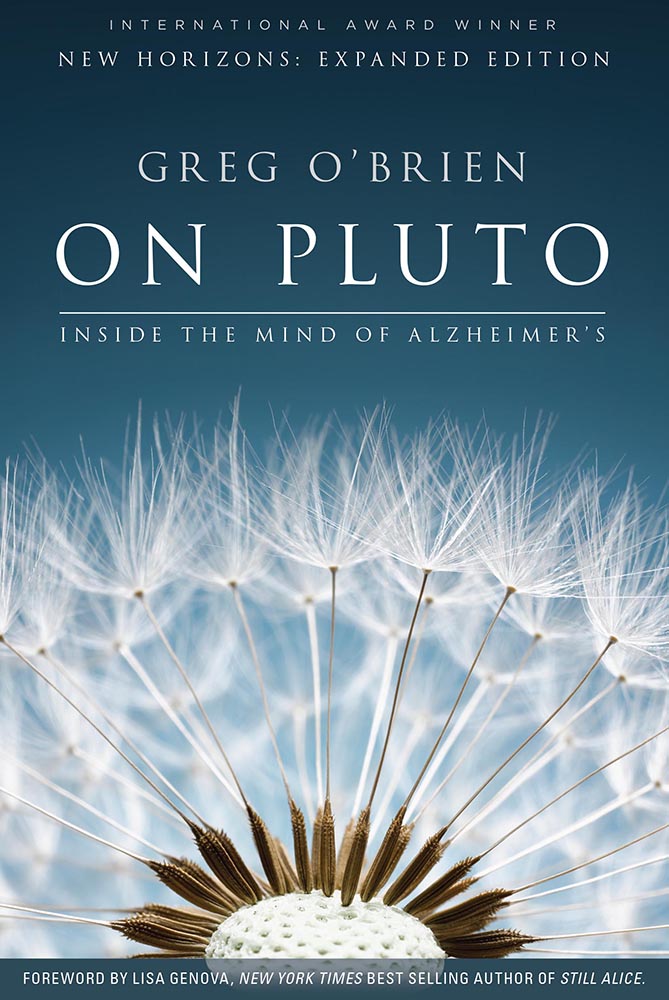Lisa Genova
Every story has a beginning, middle, and end. I met Greg O’Brien somewhere in the middle. I received an email from him the end of March 2011. He introduced himself as a journalist, a fellow Cape Codder, someone who knows my husband and his documentary film work, and a fan of Still Alice.
It was an email aimed to woo and impress me, and just as I was thinking this, I read:
“Don’t be overly impressed by the articulation of this email. It took about two hours to write. Years ago, I would have written this in five minutes or less. But it was worth the time.”
Like his mother and maternal grandfather before him, Greg had been diagnosed with early-onset Alzheimer’s. He wanted to know if we could meet and talk. I get this kind of email a lot and do my best to offer an ear, encouragement, advice, and connections for further support. It’s typically a sincere but brief relationship, most often limited to a few email exchanges. I had no idea when I agreed to meet Greg that he’d be on my mind pretty much every day since, that he’d become a close friend and personal hero.
Since I’ve known Greg, he’s been fighting through the drifting fogs of dementia, determined to press on, drawing on everything he is—brilliant journalist, adoring and faithful family man, generous and lovable Irishman with a great sense of humor, masterful storyteller—to write On Pluto. Greg is the author of four Cape Cod-related books, and has won many prestigious awards for journalism over a 30-year career, but I believe this book is Greg’s greatest achievement and contribution, not to the cure for Alzheimer’s (at least not directly), but to our understanding of how to live and love in the presence of Alzheimer’s.
In his own words, “While I have the facility to do so, I want to communicate to others, to those who will face this demon some day and those who love them, that with the proper medical direction, life strategies, faith, and humor one can prevail in the moment and lead a productive life for as long as possible.”
Understanding the scientific pathology of Alzheimer’s is critically important for improving diagnostic imaging, developing more effective treatments, and someday, discovering a cure. Understanding the science—the accumulation of amyloid and tau, identifying genetic risk factors, elucidating NMDA receptor regulation—is necessary and will take time and money.
But equally important to furthering research for a future cure is an understanding of the human experience of Alzheimer’s now. What does it feel like to live with Alzheimer’s? This kind of knowledge is also necessary, but it requires a different kind of investment. It takes courage and empathy.
We’re all terrified of Alzheimer’s. The fortress of fear, shame, stigma, alienation, and isolation that surrounds Alzheimer’s today is not unlike what we saw with cancer 40 to 50 years ago. We didn’t even say the word “cancer.” Instead we called it “the big C” in hushed voices. But something changed. We began talking openly about cancer. We began wearing looped ribbons and walking to raise awareness and money, and as communities, we began rallying around our neighbors with cancer, offering dinners and carpools and support. We acknowledged the human experience of living with cancer. And now we have treatments for cancer. We have cancer survivors.
Right now, we have no Alzheimer’s survivors. We need to find the courage to talk about Alzheimer’s, to acknowledge not just the end of this disease, but also the beginning and the middle. We need to change the image of this disease, which tends to depict only an elderly person in end stage, “an empty shell,” someone dying from Alzheimer’s. Someone who is, perhaps, easier to ignore. This image excludes the millions of people LIVING with Alzheimer’s, people newly diagnosed in their 40s, 50s, 60s, and 70s; people living somewhere in the beginning and the middle. People like Greg O’Brien.
What does it feel like to live with Alzheimer’s? What does that image look like?
This is what Greg O’Brien so bravely, intimately, and beautifully shares with us. Recounting memories of his mother and grandfather, the day of his own diagnosis, symptoms of disorientation, stories of forgetting names and faces—even his wife, told with unflinching truth, grace, and humor, Greg shares with us what it feels like to live with Alzheimer’s in the hope that we will better understand it. Understanding is the path to empathy. Empathy is the key to human connection.
Greg and I met a couple of years ago to talk about Alzheimer’s. I expected to listen to this stranger, tell him what I knew, and help him out if I could. Then he’d be on his way, and I’d go back to my life without Greg O’Brien. Instead, I sat with a man so open and real, a man fighting to be present and live every single day to the fullest, with everything he’s still got, a man who could find humor in the ugliest and scariest of moments. I was captivated, enamored, inspired. Surprised.
Since that day, Greg’s Alzheimer’s continues to advance, but the man I met more than two years ago is still here. He’s tenacious, funny as hell, generous, incredibly smart, and brave. He’s still open and real. He loves his family, his friends, and Cape Cod with a huge heart. He’s a man I’m proud to call my friend.
Greg has told me many times that he believes his purpose is to share this story, that it might reach and improve the lives of millions of people traveling a similar journey.
I believe it will, Greg.
—Lisa Genova, PhD, New York Times best selling author of Still Alice, Left Neglected, and Still Anthony
